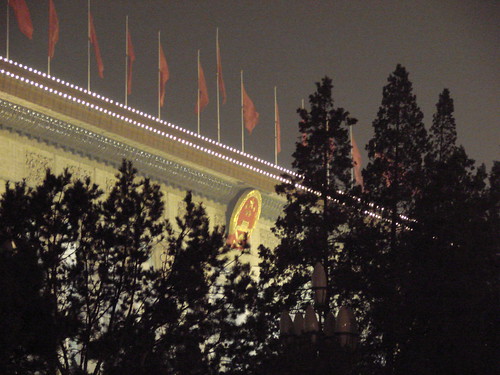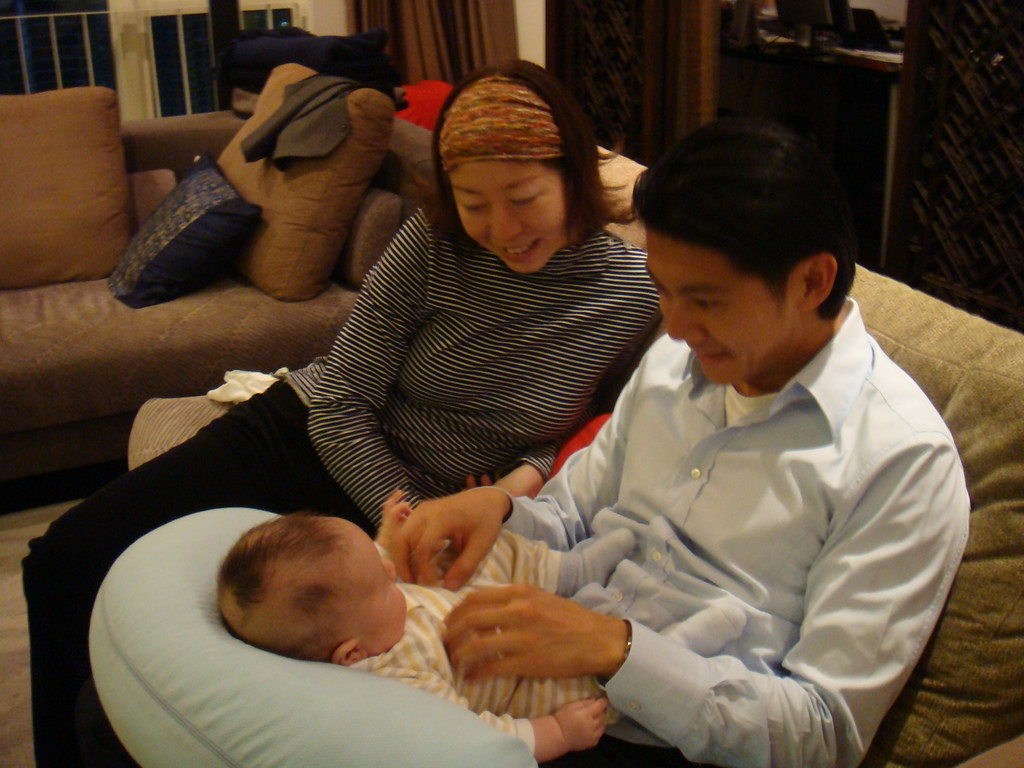 The past week I spent with a senior Dutch delegation of IT and new media executives that visited China. I organized most of the company visits in Shanghai and Chengdu, and of course I also made sure that we had a good evening program. Already a year ago Marco Derksen (Marketingfacts.nl) had talked to me about organizing a trip to China, and last September during the PICNIC conference in Amsterdam the topic came up again. Marco, Vincent Everts and myself then started to develop the idea and in November we had decided on a date and a rough program. We aimed at about 15-20 participants, but eventually ended up with 42 people. Mainly founders or CEO’s of companies, but also people from the Dutch media, universities and some investors. A high-level group with high-level expectations, so I did my utmost to make it a success.
The past week I spent with a senior Dutch delegation of IT and new media executives that visited China. I organized most of the company visits in Shanghai and Chengdu, and of course I also made sure that we had a good evening program. Already a year ago Marco Derksen (Marketingfacts.nl) had talked to me about organizing a trip to China, and last September during the PICNIC conference in Amsterdam the topic came up again. Marco, Vincent Everts and myself then started to develop the idea and in November we had decided on a date and a rough program. We aimed at about 15-20 participants, but eventually ended up with 42 people. Mainly founders or CEO’s of companies, but also people from the Dutch media, universities and some investors. A high-level group with high-level expectations, so I did my utmost to make it a success.
The last weeks before the group arrived were not easy, because the Shanghai office of a German event agency that I had hired to help with the organization failed to deliver results. One of their German expats who was in charge of the project totally messed up, so I basically had to take control of the project next to my daily work. The event agency eventually replaced the young German man with some great, hard-working local employees and avoided a disaster by doing so. But it caused me quite a bit of stress both in the days before the trip and during the trip itself. Eventually most things were sorted out, but it cost me a lot of sleep. I will have a word with the head of the event agency this week about what happened. As for the German employee, I would be very surprised if this will not have consequences for him and I will certainly make a recommendation on what to do with him. The event agency is actually pretty good, but this kind of employees are a real danger for a company, especially when they are so smooth-talking that nobody realizes what is really going on.
The group arrived in Shanghai on Sunday morning at 8 AM and spent most of the day walking through Shanghai. We visited the Bund, Yuyuan, Xintiandi and part of the French Concession (all on foot of course), and were back in the hotel by 5 PM for a cocktail reception with Mr. Eric Verwaal, the Dutch consul general. After the reception he gave a very interesting presentation on the history and economic development of China. It was a pity that for some participants the combination of jet-lag and a couple of beers plus the high temperature in the room meant that they could not manage to stay awake during the talk, they missed some good insights. Next time it’s probably better to first have a presentation and then do the cocktails. At night we had dinner with the sub-groups (the group was divided in 6 sub-groups that focus on one area, mine was (not surprisingly) online games). By 11 PM most people were completely exhausted and dragged themselves to bed.
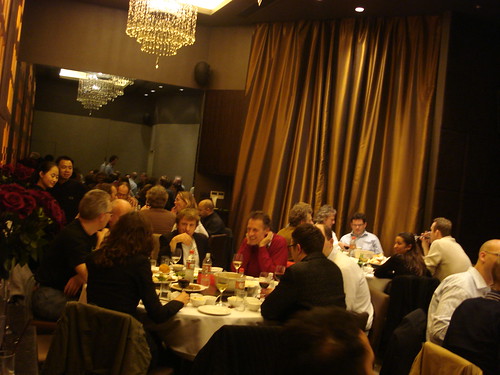
On Twitter I noticed that Vincent Everts continued to work until at least 2 AM on the first of his videos. He produced a whole series of them, and most of them can be seen here (in China you will need a proxy). Several were also published on sites of major Dutch media, such as De Telegraaf, het Financieel Dagblad, Webwereld and nu.nl. Lots of exposure for the trip, but not much sleep for Vincent because of this. Because most of the participants are highly active on the internet the whole week articles and blogs appeared in Dutch media, and there were lots of tweets on Twitter (backchannel keyword Chinareis) and pictures on Flickr (tag: Chinareis).

Monday and Tuesday we mainly had company visits in Shanghai. We divided the group into 3 tracks, so people could decide where to go. We tried to make each track equally attractive, but that was not easy. Some of the many companies that we visited on Monday and Tuesday included CIC, Ubisoft, JWT, Philips, iResearch, CEIBS, Tudou and Spill Group/Zlong Games (there Thijs and I even gave presentations to two groups). Tuesday night we organized a network dinner at Three on the Bund where a total of 73 people participated. Wednesday was a travel day, but in the morning we arranged a visit to the Lenovo plant in Shanghai for one half of the group and a visit to Shanghai Media Group for the other half. In the afternoon we traveled to Chengdu.
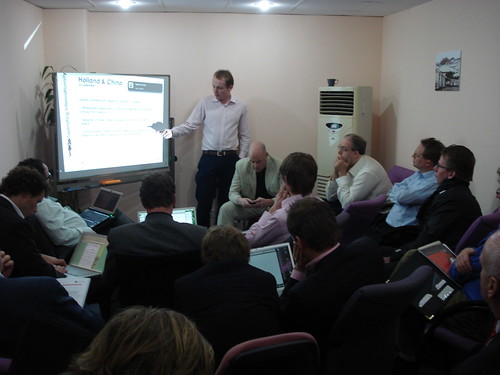
Thursday was a company visit day again, with an introduction by the Chengdu Hi-Tech Zone government and 9 company visits (among others Shanda and Plenware, but also the EU China incubator center). This was followed by a tour of Sichuan University, where the participants not only saw the campus and the classrooms, but even got to take a look at the dorms from the inside (which was a shock for some). At night we had the Chengdu network dinner, where the basis for some business deals was made.
 Friday was Qingming Festival in China, which this year for the first time was a public holiday in China. Company visits were therefore not possible, so we organized a seminar where a venture capital firm and two start-ups (CallMe and Yawaa) got to present. Then the local government gave a presentation, followed by a presentation and live demonstration of Pioco (bluetooth media) in the main shopping street in Chengdu. The afternoon was even for me a bit of a surprise. Steve Chao, Pioco’s CEO, had organized it and he did an excellent job. We first drove to Dujiangyan where we were guests of honor at the “Water Release Festival”. Actually, this is a once-a-year performance, but the mayor arranged that the impressive performance would be done one more time especially for this group! We were very honored of course.
Friday was Qingming Festival in China, which this year for the first time was a public holiday in China. Company visits were therefore not possible, so we organized a seminar where a venture capital firm and two start-ups (CallMe and Yawaa) got to present. Then the local government gave a presentation, followed by a presentation and live demonstration of Pioco (bluetooth media) in the main shopping street in Chengdu. The afternoon was even for me a bit of a surprise. Steve Chao, Pioco’s CEO, had organized it and he did an excellent job. We first drove to Dujiangyan where we were guests of honor at the “Water Release Festival”. Actually, this is a once-a-year performance, but the mayor arranged that the impressive performance would be done one more time especially for this group! We were very honored of course.

After that we went to Jiezi, a small village, where the group could stroll around. A local TV crew filmed us during the whole visit. We wer
e the only foreigners as this part is apparently not open to foreigners at the moment, and Vincent Everts and I were asked to do an interview with them (“Will you tell the people in Holland about Jiezi?”). The last part of the visit was to Mt. Qingcheng, the birth place of Taoism. To our big surprise, we were received by the head of the Taoist religion and she (yes, the head is a woman) showed us around the temple / monastery where she lived. She also invited us for tea in a place where normally high officials are received (the proof were the pictures on the wall of Chinese leaders sipping tea with her in the same room). It was a magnificent place to be, and most participants (including me) were quite impressed. I knew that Steve has excellent connections, but the afternoon program was better than I had ever expected.
 At night we had farewell hot pot dinner where I received lots of presents (including a great book by Al Gore and an iPhone – thanks guys!), followed by a night on the town in club One. We actually spent every night in bars and night clubs, and because of that I did not get too much sleep (on average less than 4 hours a night). But that did not matter, it was an excellent week, where I got to know many new people and where the group hopefully got a better understanding of what is happening in China. That last part was one of my main objectives for organizing this trip. I love China and its people, and (as I said before) I feel the foreign media does not do the country justice in its reporting. It’s not so black and white as many people seem to think, and I hope a lot of people in the group realize that there is more to the China story than you read in the average foreign newspaper.
At night we had farewell hot pot dinner where I received lots of presents (including a great book by Al Gore and an iPhone – thanks guys!), followed by a night on the town in club One. We actually spent every night in bars and night clubs, and because of that I did not get too much sleep (on average less than 4 hours a night). But that did not matter, it was an excellent week, where I got to know many new people and where the group hopefully got a better understanding of what is happening in China. That last part was one of my main objectives for organizing this trip. I love China and its people, and (as I said before) I feel the foreign media does not do the country justice in its reporting. It’s not so black and white as many people seem to think, and I hope a lot of people in the group realize that there is more to the China story than you read in the average foreign newspaper.
 Last Friday Tudou celebrated its 3rd anniversary party in the Tudou Warehouse in Shanghai. About 200-300 people attended the party, that already started at 8 PM (parties in China always start a lot earlier than in Europe). The entrance lane to the Warehouse was decorated with lights, and the new Tudou logo was projected in several colors on the outside walls. Inside, part of the first floor was redecorated as a club with a small stage and professional DJ’s. As usual during our parties there was an open bar, with among others Absolut vodka mixes (Absolut sponsored some of the drinks) and all kinds of beers (several US microbrews and of course Tsingtao). After a not-so-good experience with Absolut during an earlier Tudou party (where I cannot even remember how I got home), I mainly drank the microbrews, and they were excellent.
Last Friday Tudou celebrated its 3rd anniversary party in the Tudou Warehouse in Shanghai. About 200-300 people attended the party, that already started at 8 PM (parties in China always start a lot earlier than in Europe). The entrance lane to the Warehouse was decorated with lights, and the new Tudou logo was projected in several colors on the outside walls. Inside, part of the first floor was redecorated as a club with a small stage and professional DJ’s. As usual during our parties there was an open bar, with among others Absolut vodka mixes (Absolut sponsored some of the drinks) and all kinds of beers (several US microbrews and of course Tsingtao). After a not-so-good experience with Absolut during an earlier Tudou party (where I cannot even remember how I got home), I mainly drank the microbrews, and they were excellent.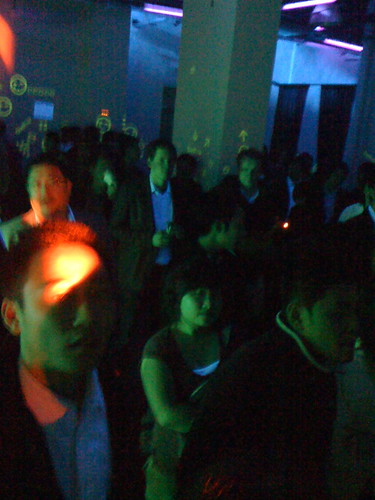 Around 9 pm a video of the past 3 years was shown (I missed it, because I was trying to direct guests to the Warehouse – it’s not easy to find), and then Gary gave a short speech. Then the evening really started with professional dancers doing a show. Later in the evening Gary and I cut the 3-year anniversary cake (that was made by Yang Lei, good job!), and I was glad that this time people ate it instead of throwing it all around like during our 2nd anniversary. The first floor hallway walls were still virgin white, and soon the party goers were putting graffiti all over it. Now those walls look as cool as the second floor, that was covered in user-generated content two years ago already.
Around 9 pm a video of the past 3 years was shown (I missed it, because I was trying to direct guests to the Warehouse – it’s not easy to find), and then Gary gave a short speech. Then the evening really started with professional dancers doing a show. Later in the evening Gary and I cut the 3-year anniversary cake (that was made by Yang Lei, good job!), and I was glad that this time people ate it instead of throwing it all around like during our 2nd anniversary. The first floor hallway walls were still virgin white, and soon the party goers were putting graffiti all over it. Now those walls look as cool as the second floor, that was covered in user-generated content two years ago already.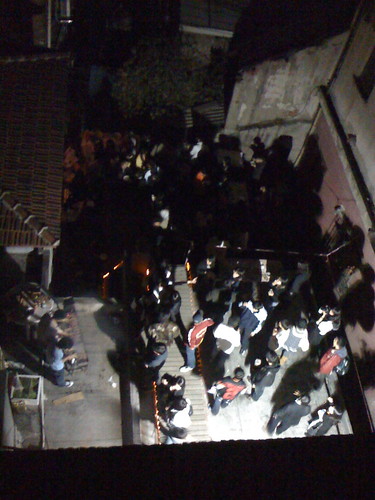 It was a great evening, and we were lucky that the weather was also quite good so we could spend most of the night outside. Around 2 AM we decided to call it a night, when I realized I had not seen my wife for quite some time. It turned out she had called a meeting of some of her staff and they were just finishing up (she is very dedicated to her work!). She then went home, but Gary and I decided to continue the celebration in Lounge 18. We managed to get a table there and had a few bottles of champagne. Once again a Tudou night to remember!
It was a great evening, and we were lucky that the weather was also quite good so we could spend most of the night outside. Around 2 AM we decided to call it a night, when I realized I had not seen my wife for quite some time. It turned out she had called a meeting of some of her staff and they were just finishing up (she is very dedicated to her work!). She then went home, but Gary and I decided to continue the celebration in Lounge 18. We managed to get a table there and had a few bottles of champagne. Once again a Tudou night to remember!


